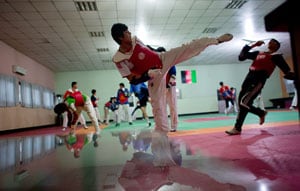British controversy overshadows Games prep
An ugly selection controversy surrounding a British entrant into the Olympic Taekwondo competition has been dominating the news ahead of the London Games.
- Written by Agence-France Presse
- Updated: July 25, 2012 06:16 pm IST
 An ugly selection controversy surrounding a British entrant into the Olympic Taekwondo competition has been dominating the news ahead of the London Games.
An ugly selection controversy surrounding a British entrant into the Olympic Taekwondo competition has been dominating the news ahead of the London Games.
Olympics 2012 | Schedule | Venues | Medals Tally
Olympic hosts Britain created a furore by selecting Lutalo Muhammad, ranked 59th in the world, ahead of the world number one Aaron Cook in the under-80kg division.
European champion Cook appealed the decision and took his case to the British Olympic Committee (BOA) while the World Taekwondo Federation (WTF) also launched an investigation into the fiasco.
The BOA has since ruled in British Taekwondo's favour and Cook, who considered legal measures against them, has been left in the lurch.
The problem stems from the fact that there are eight weight divisions for both men and women in international competition but at the Olympics there are only half that number.
It means fighters who usually fight at one weight have to try to change their category in Olympic year if they want to compete at the Games.
On top of that, each country is only allowed to select fighters in half of the available categories, meaning that national team squads comprising eight men and women are whittled down to just two of each.
Muhammad was ranked seven in the world at under-87kg after winning the Europeans in his division but rather than stepping up to heavyweight, he opted to come down to under-80kg and try to challenge Cook.
However, with limited time competing in his new category and with the combination of two categories -- under-80kg and under-74kg -- for Olympic qualification, Muhammad is actually ranked 103rd in the official Games ranking list.
British Taekwondo said they had a specific slection criteria and that Muhammad had earnt his spot, but overlooking the world number one for a man ranked outside the top 100 has not gone down well.
"We are extremely disappointed by the way in which British Taekwondo's selection process has been conducted," Jean-Marie Ayer, the WTF secretary general, said in the statement.
"Our main concern is always that every athlete is given fair and equal consideration."
Cook and Muhammad have fought twice in the past, winning once each.
South Korea, the country that created the sport, are by far the dominant force and have been since the inception of international competition in 1973.
Their total of 152 gold medals at the World Championships is 40 more than everyone else put together.
However, last year they won only two gold medals in the men's divisions compared to three from Iran, a marked shift in power.
It was the first time the men's team had ever been beaten at a world championships.
And only three years ago, the women's team lost for the first time too, having their results surpassed by China.
South Korea's dominance has been far less acute at Olympic level due in no small part to the reduced field, which means each country can only field two men and two women.
It means only two of Iran's three world champions Alireza Nasr Azadani, Farzad Abdollahi and Yousef Karami will be allowed to attend whereas South Korea could send both their male world champions Lee Dae-Hoon and Jo Chol-Ho.
France, for example, have two women's world champions but that is in the top two weight divisions, over-73kg and under-73kg.
The top weight in the women's Olympic competition is over-67kg meaning Gwladys Epangue and Anne-Caroline Graffe would have been competing for the same spot but for the former's tuberculosis which has ruled her out of the Games.
Without Cook, the host nation's main hope will come from women's world under-67kg champion Sarah Stevenson.
